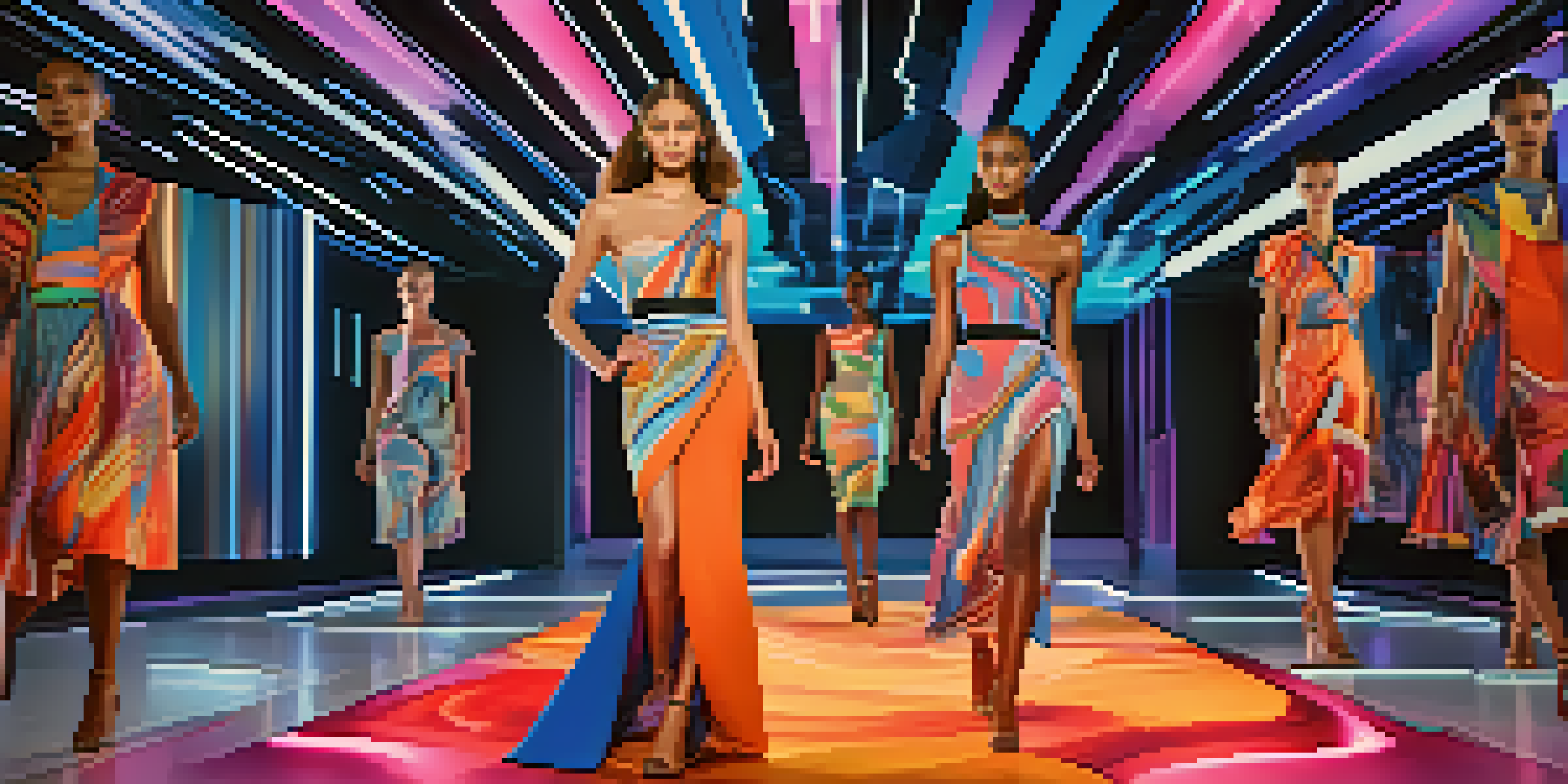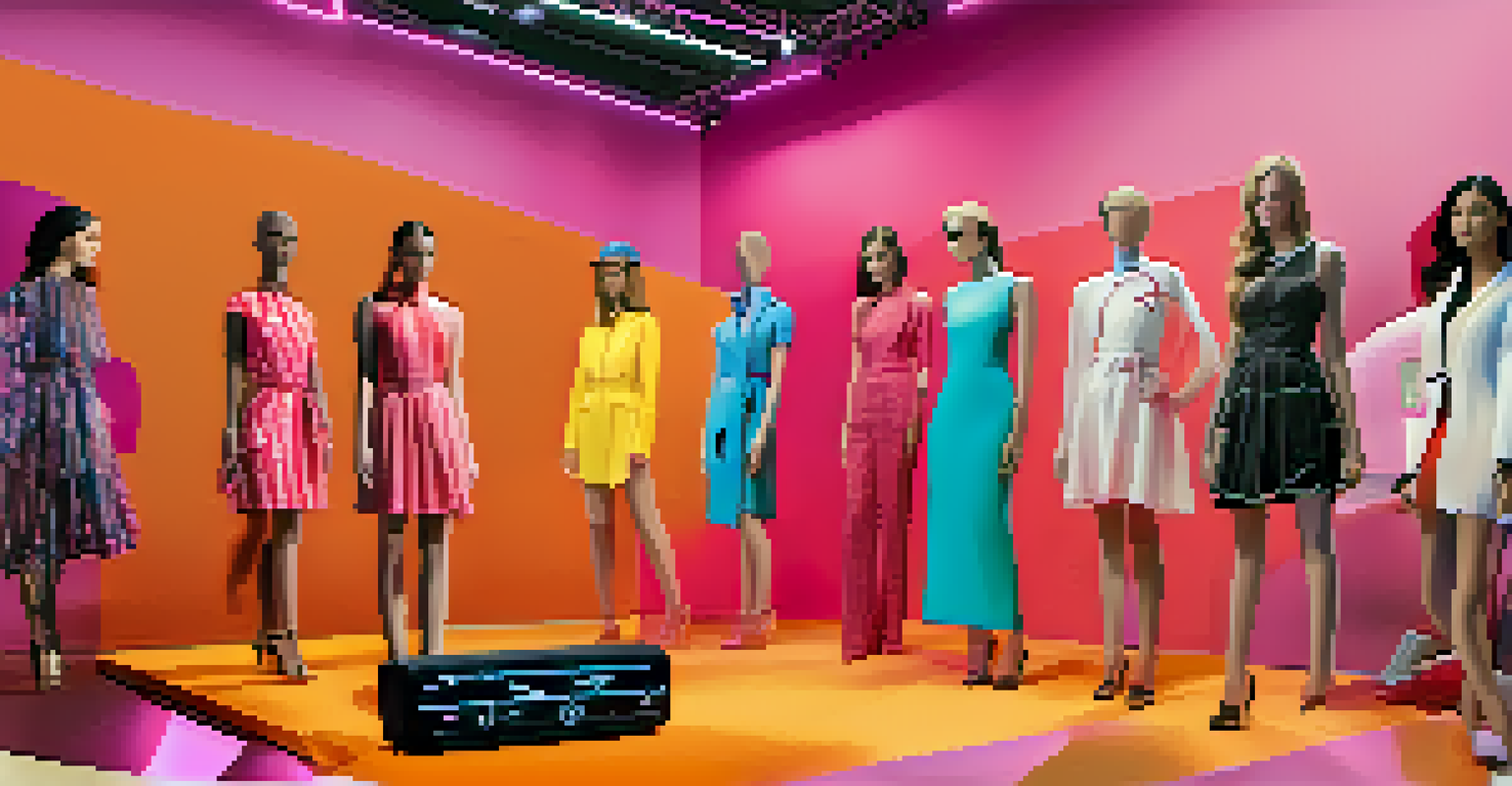Digital Fashion Shows: Startups Pioneering Online Runway Events

The Rise of Digital Fashion Shows in Recent Years
Digital fashion shows have gained significant traction over the past few years, particularly accelerated by the pandemic. As traditional runway events faced restrictions, designers and brands turned to online platforms to showcase their collections. This shift not only allowed for wider audience reach but also opened doors for innovative presentation styles that weren't possible in physical venues.
Fashion is not something that exists in dresses only. Fashion is in the sky, in the street, fashion has to do with ideas, the way we live, what is happening.
The beauty of digital fashion shows lies in their accessibility. Anyone with an internet connection can experience the latest trends, breaking down the barriers that once limited attendance to industry insiders and celebrities. Emerging brands can now share their vision with a global audience, democratizing fashion in ways we never thought possible.
Moreover, these virtual events often incorporate interactive elements, such as live chats and social media integration, enhancing viewer engagement. This new format allows audiences to connect directly with designers, creating a communal atmosphere that traditional shows often lack.
Startups Leading the Charge in Digital Runway Events
Several innovative startups are at the forefront of the digital fashion show movement, reshaping how we experience fashion. Companies like The Fabricant and DressX are not only creating digital clothing but also hosting full-fledged virtual shows that highlight their unique offerings. These platforms are pioneering a new era where digital fashion is just as valued as physical attire.

Another notable player is Runway, which focuses on providing an immersive and interactive experience for viewers. By combining augmented reality (AR) and 3D modeling, they offer audiences a chance to virtually try on garments, blurring the lines between the digital and physical realms. This kind of innovation is what sets these startups apart in a crowded market.
Digital Fashion Shows Surge
The rise of digital fashion shows, accelerated by the pandemic, has made fashion more accessible and opened doors for innovative presentation styles.
Furthermore, they provide valuable data analytics for brands, helping them understand consumer preferences and trends in real time. This insight is invaluable for fashion designers looking to make informed decisions about their collections and marketing strategies.
Innovative Technologies Shaping Online Fashion Events
Technology plays a pivotal role in the success of digital fashion shows. From high-quality streaming services to advanced graphics and virtual reality (VR), the experience is designed to captivate and engage viewers. For instance, VR can transport audiences to stunning virtual environments, making them feel like they're front-row at a live event, even if they're watching from home.
The best way to predict the future is to create it.
Additionally, artificial intelligence (AI) is being used to personalize experiences for viewers. By analyzing user behavior and preferences, AI can recommend outfits or styles that suit individual tastes, creating a tailored experience that enhances viewer satisfaction. This level of personalization is something traditional fashion shows rarely offer.
Moreover, the integration of blockchain technology is starting to gain momentum, ensuring authenticity and traceability of digital garments. This not only helps brands maintain credibility but also fosters trust among consumers investing in virtual fashion.
Challenges Faced by Digital Fashion Startups
Despite the excitement surrounding digital fashion shows, startups face several challenges in this evolving landscape. One significant hurdle is the initial skepticism from traditional fashion players who might view digital formats as inferior to physical shows. Overcoming this perception requires consistent quality and innovative presentations that impress both audiences and industry insiders.
Another challenge is the technical aspect of creating seamless experiences. Startups must ensure their platforms can handle large audiences without glitches, which can be a daunting task. Any technical difficulties during a live event can lead to frustration and disengagement from the audience, ultimately affecting brand reputation.
Startups Innovate Fashion Events
Innovative startups are reshaping digital runway experiences with interactive technologies like AR and AI, enhancing viewer engagement and personalization.
Lastly, monetization remains a critical issue. While digital shows can reach a wide audience, finding effective ways to convert viewers into paying customers is essential for sustainability. Startups are exploring various models, from virtual ticket sales to exclusive content subscriptions, but the path to profitability is still being charted.
The Environmental Impact of Digital Fashion Shows
One of the most compelling arguments for digital fashion shows is their potential for a reduced environmental footprint. Traditional runway shows often involve significant waste, from elaborate set designs to travel and accommodations for attendees. By shifting to a digital format, brands can minimize their ecological impact while still reaching a global audience.
Moreover, digital fashion allows for the creation of virtual garments that don’t require physical resources to produce. This shift can lead to a more sustainable approach to fashion, encouraging brands to rethink their production processes. The move towards digital collections aligns with the growing consumer demand for eco-friendly practices in the fashion industry.
However, it's essential to balance the digital experience with sustainability. As startups innovate in this space, they must also consider the environmental implications of their technologies, such as energy consumption from data centers and streaming services. Striving for a greener approach will be crucial for the longevity of digital fashion.
Consumer Engagement in the Digital Fashion Sphere
Engaging consumers is vital for the success of digital fashion shows. Startups are leveraging social media platforms to create buzz around their events, encouraging users to share their experiences and interact with the brand. This grassroots marketing approach fosters a sense of community and excitement that can significantly enhance viewer participation.
Interactive features such as polls, Q&A sessions, and live chats during shows allow audiences to feel involved in the experience. These elements not only make the event more enjoyable but also provide valuable feedback for designers and brands. Understanding audience reactions in real-time can lead to more tailored collections in the future.
Sustainability in Digital Fashion
Digital fashion shows can reduce environmental impact by minimizing waste and promoting eco-friendly practices while still reaching global audiences.
Additionally, collaborations with influencers and digital creators help amplify brand messages. By partnering with popular figures in the fashion and tech spaces, startups can reach broader audiences and build credibility. These collaborations often result in creative content that resonates with consumers, further enhancing engagement.
The Future of Fashion: Blending Digital and Physical Realms
As we look to the future, the line between digital and physical fashion shows is expected to blur even further. Hybrid events combining physical runway presentations with virtual experiences may become the norm, allowing brands to cater to both traditional audiences and the growing number of digital consumers. This approach could create a more inclusive atmosphere that welcomes everyone into the fashion world.
Moreover, advancements in technology, such as 5G and improved AR capabilities, will likely enhance the digital experience. Faster internet speeds and more sophisticated devices will enable richer, more immersive presentations, making it easier for brands to showcase their creativity. As these technologies evolve, so too will the possibilities for online fashion events.

Ultimately, the future of fashion shows will hinge on innovation and adaptability. Startups that can successfully navigate this landscape and leverage the power of digital platforms will not only thrive but also redefine what fashion means in our increasingly interconnected world.